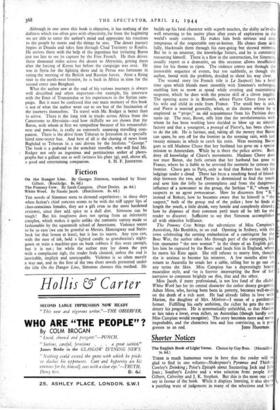Fiction
On the Danger Line. By Georges Simenon, translated by Stuar Gilbert. (Routledge. 8s. 6d.) The Pommy Cow. By Sarah Campion. (Peter Davies. 9s. 6d.) White Wool. By Naomi Jacob. (Hutchinson. 8s. 6d.)
THE novels of Simenon seem to demand superlatives: in these days when fiction's chief concern seems to be with the stiff upper lips of class-conscious females, they are a gift even to the most hardened reviewer, since they add spice to a dull diet. Simenon can be tough! But his toughness does not spring from an inferiority complex, which makes it quite unlike the romantic variety made so fashionable by the squeamish school of Americans. Violence seems to be so easy (we can be grateful to Messrs. Hemingway and Stein- beck for that lesson at least), but it has its snares. Any tyro can, with the ease of ink, hold a lighted candle to grandmaina's night- gown or train a machine-gun on bank robbers if this were enough, but it is not ; for while the author may lay down the pen with a complacent sigh, the reader feels cheated, unless the end is inevitable, implicit and unescapable. Violence is so often merely a way out, and in the first of the two short novels presented under the title On the Danger Line, Simenon chooses this method. He
builds up his fatal character with superb touches, the shifty ne'er-da well returning to his native place after years of exploration in the
world's seedy corners. He makes him both envious and con- temptuous of the respectable stay-at-homes. He cheats them skil- fully, blackmails them through his easy-going but shrewd mistress. But he is an amateur, the knowledge festers, and he is constantly reassuring himself. There is a flaw in the construction, for Simenon, usually expert as a dramatist, on this occasion allows insufficient time for his theme to ripen. The violence comes not through the inexorable sequence of events, but too suddenly, as though the author, bored with the problem, decided to shoot his way clear.
The second story (its French title is Le Suspect) has a brief time span which blends most smoothly with Simenon's technique, enabling him to move at speed while creating and maintaining suspense, which he does with the precise skill of a clever juggler. The opening scene is in Brussels, where Pierre Chave lives with his wife and child in exile from France. The small boy is sick, and Pierre is worried generally, when, at the theatre where he Is employed as " props," an old acquaintance from his Parisian days turns up. The man, Baron, tells him that the revolutionaries with whom he has been working have decided to blow up an aircraft factory and that a youngster, a protege of Pierre's, has been chosen to do the job. He is furious, and, taking all the money that Baron can spare, he sets off for the frontier in the teeming rain, with just twenty minutes in which to catch his train. Next morning Barran goes to tell Madame Chave that her husband has gone on a special mission to Amsterdam. While he is there the police arrive. Both deny all knowledge of Chave's movements. Madame Chave does not trust Baron, she feels certain that her husband has gone to France, where he is liable to be arrested the moment he crosses the frontier. Chave gets to Paris, only to find that Robert has left his lodgings under a cloud. There has been a touching bond of friend- ship between the two, and Pierre is determined to find the youth and save him the folly he contemplates and from the dangerous influence of a newcomer to the group, the Serbian "K," whom he suspects as an agent provocateur. How he discovers first "K " instead of Robert, how he becomes aware that he himself is " the suspect," both of the group and of the police ; how he finds at length the youth, a little drunk, very hostile and completely altered; how he disposes of their common peril must all be left for the reader to discover. Sufficient to say that Simenon accomplishes all with objective brilliance.
The Pommy Cow brings the adventures of Miss Campion's Australian, Mo Burdekin, to an end. Opening in Sydney, with the
town celebrating the coming embarkation of a contingent for the Boer War, the author takes Mo through part of the campaign, lets him encounter " the new woman " in the shape of an English girl, lets him be captured by the Boers and lands him in England, where he meets his Kate again. She still refuses to marry him, though she is anxious to become his mistress. A few months after his
return to Australia he sends her a cable, telling her to go out on any terms she likes. Miss Campion has a depressingly hearty masculine style, and she is forever interrupting the flow of her f narrative to comment brightly on this, that and the other.
Miss Jacob, if more professional, is not less fond of the cliche. White Wool has for its central character the rather dreary go-getter,
Adam Moss, who, having been born in poverty, becomes well-to-do on the death of a rich aunt. He had already fallen in love with Marion, the daughter of Mrs. Miniver—I mean_ of a gentleman farmer. Fulfilling his early ambition, the richer he gets the more dreary his progress. He is systematically unfaithful, so that Marion at last takes a lover, even richer, an Australian (though hardly one Miss Campion would recognise). The story becomes more and more improbable, and the characters less and less convincing, as it pr)-


























 Previous page
Previous page